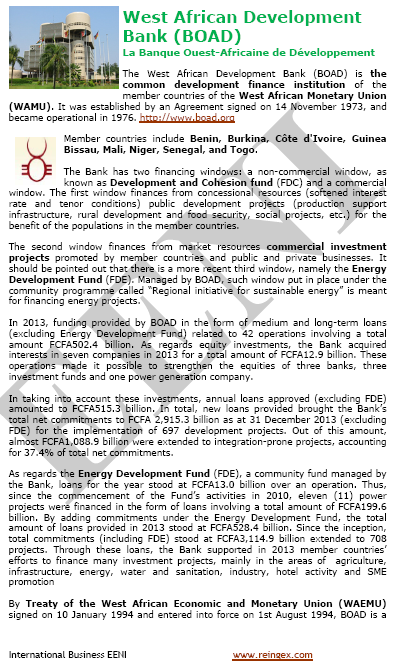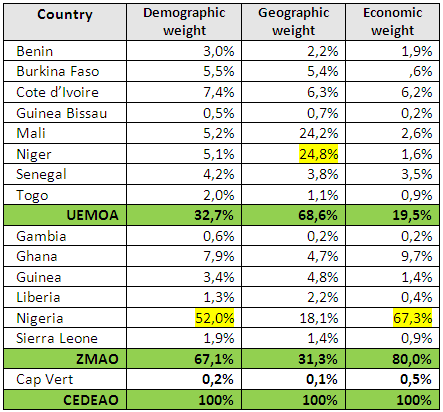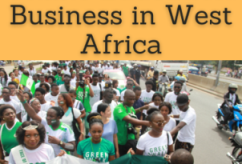West African Economic Monetary Union (WAEMU)
CFA Franc - West African Economic and Monetary Union (WAEMU) Senegal, Togo, Mali, Niger

In 1994 was founded the West African Economic and Monetary Union (WAEMU) by seven West African Countries using the CFA Franc (common currency): Benin, Burkina Faso, Ivory Coast, Mali, Niger, Senegal, and Togo.
Guinea-Bissau became a member of WAEMU in 1.997.
The West African Economic and Monetary Union has implemented a common market based on the free movement of persons, goods, services, capital, and the right of establishment.

Religions and Global Business -
Religious diversity
- Introduction to the West African Economic and Monetary Union (WAEMU/UEMOA)
- Objectives, Functioning and Institutions of the West African Economic and Monetary Union
- Members economies of WAEMU: Benin, Burkina Faso, Ivory Coast, Mali, Niger, Senegal, and Togo
- Activities carried out and policies implemented by WAEMU
- Community Competition Policy
- Legal Framework: WAEMU Treaty
- Achievements of the Economic and Monetary Union of West Africa
- Common Market
- Common External Tariff
- Sectoral Policies
- African Monetary Zone (WAMZ). CFA Franc
- West African Monetary Institute
- Case Study: Opportunities for Increasing Cross-Border Trade in the Banking Sector
- Political Context of WAEMU
- Structural Competitiveness of WAEMU Countries
- Economy of WAEMU
region
- Economic profile of WAEMU's Member States
- Case Study: Impact of Malian crisis on WAEMU
- Customs Union of WAEMU
- WAEMU's Institutions
- Central Bank of West African States (BCEAO)
- West African Development Bank (BOAD)
- Cauris Management (private equity fund manager)
- Guarantee Fund for Private in West Africa (GARI)
- Case Study: Banking sector in WAEMU region
- WAEMU countries and AGOA
- Doing Business in West African Countries
- WAEMU-U.S. Agreement

The educational aims of the Subject “West African Economic and Monetary Union (WAEMU/UEMOA)” are:
- To understand the purposes and functions of WAEMU
- To learn about WAEMU Treaty
- To assess the benefits for the member countries of WAEMU
- To analyze the economic context of WAEMU
- To research the economic integration process (Common Market, Common External Tariff) and Foreign Trade among the West African Economic and Monetary Union member states
- To learn about WAEMU Customs Code
- To explore financial and banking system of the UEMOA and the role of the Central Bank of West African States
- To analyze the role of affiliated institutions of WAEMU

The Subject “West African Economic and Monetary Union (WAEMU)” is included within the curriculum of the following academic programs at EENI Global Business School:
Master in Business in Africa, International Business, Foreign Trade.

Doctorate in African Business.

Languages:  or
or  Union Économique et Monétaire Ouest Africaine (UEMOA)
Union Économique et Monétaire Ouest Africaine (UEMOA)  Unión Económica y Monetaria del África Occidental (UEMOA)
Unión Económica y Monetaria del África Occidental (UEMOA)  União Econômica e Monetária do Oeste Africano (UEMOA).
União Econômica e Monetária do Oeste Africano (UEMOA).
- Subject Credits “West African Economic and Monetary Union (WAEMU)”: 2

Area of Knowledge: Africa.
WAEMU - West African Economic and Monetary Union
The objectives of the West African Economic and Monetary Union are to intensify the economic and financial activities competitiveness of the West African Economic and Monetary Union economies, developing an open and competitive market and a harmonized legal environment.
All these countries share a common currency, the CFA Franc.
The WAEMU has achieved several objectives (harmonization of laws, common policy, free movement, competition rules), but some obstacles, and even delay, are slowing the integration process.
A portion of the common external tariff (CET) - entered into force in 2000- WAEMU is used to finance the institution.
The West African Economic and Monetary Union Inter-Parliamentary Committee adopted a draft treaty on the creation of a regional parliament.
West African Economic and Monetary Union (WAEMU).
- Area: 3,509,600 km²
- Population: 112 million people
- Main religions: Islam and Christianity
- Military coups in Mali and Guinea-Bissau
- Economic recovery of Ivory Coast

The economies of the Member States of the Economic and Monetary Union of the Africa West (WAEMU) suffered from an unfavourable global environment, characterized by high food products prices derived from petroleum, as well as the global crisis.
The Central Bank of West African States (BCEAO) is the financial institution of the eight Member States of the West African Monetary Union. The Central Bank of the West African States is an international public institution based in Dakar.
The West African Development Bank (BOAD) is a common institution created to finance the economy development in West African Monetary and Economic Union. It was founded on November 1973. Its Member States are Benin, Burkina Faso, Ivory Coast, Guinea-Bissau, Mali, Niger, Senegal, and Togo.
The Economic and Monetary Union of the Africa West (WAEMU) belongs to the West African Economic Area.
See also: West African Monetary Zone (WAMZ).
West African Ports: Dakar, Abidjan, Cotonou, and Lomé.
Trans-African corridors:

(c) EENI Global Business School (1995-2025)
Top of this page









 WhatsApp
WhatsApp